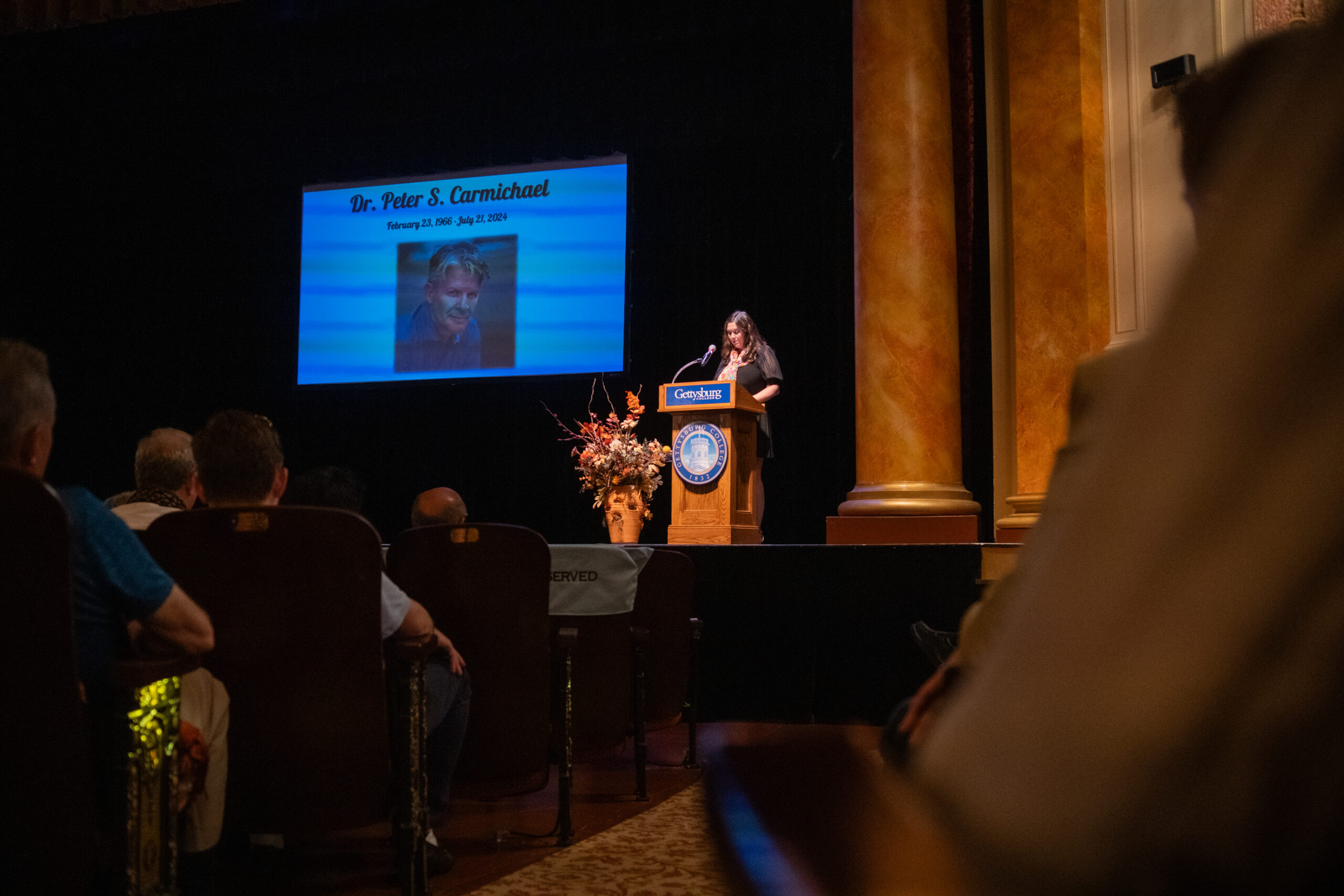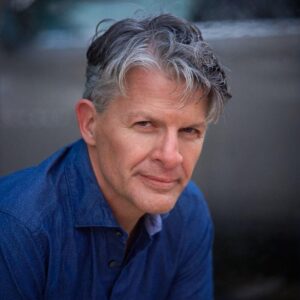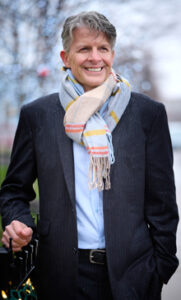In Memory of Professor Peter Carmichael

CWI assistant director Ashley Luskey speaking at Peter Carmichael’s Celebration of Life at Majestic Theater. (William Oehler/The Gettysburgian)
Colleagues reflect on the “larger-than-life” personality and legacy of Pete Carmichael
By Vincent DiFonzo, Editor-in-Chief
Professor Peter Carmichael, a husband, father of two, 14-year director of the Civil War Institute and beloved Gettysburg College professor, died on Sunday, July 21 at the age of 58. Carmichael left behind a legacy of compassion for others and a genuine passion for his students’ success, in addition to deep historiographical insights into the American Civil War era.
His funeral, held on the Saturday following his death, was attended by hundreds of his colleagues, former students and friends. Attendees flew in from across the country to honor his legacy. On Friday, Sept. 20, friends, students and colleagues gathered in the Majestic Theater for a celebration of Carmichael’s life, another example of how big Carmichael’s loss is to members of this community.
The Gettysburgian met with a number of Carmichael’s colleagues to collect reflections, stories and tributes on his life and the legacy he leaves behind. This story is the culmination of these conversations.
Jill Ogline Titus, professor of history & CWI interim director, worked closely with Carmichael since her arrival at Gettysburg in 2012. She characterized him as “a really special person” whose personality was “so huge and so vibrant,” while also describing him as “very genuine and truly interested in everyone around him.”
Titus continued, “People weren’t props to him. People were friends, colleagues and students. Even though he just radiated all this energy and all this light, he made sure everybody else felt really valued and important too, and that is a rare gift.”
She recalled when Carmichael survived brain cancer after being diagnosed in the fall of 2013.
“The prognosis was not good at all — he thought he was going to die, we all thought he was going to die. I remember him and Beth, his wife, it was on the day of his diagnosis. And I remember the grief and the difficulty, and how hard it was for all of us,” said Titus. “But first of all how determined he was to fight it and get all the treatment he could, and secondly his sense that, ‘I’ve had a wonderful life and I’m grateful for everything that I’ve had.’”

Professor Peter Carmichael. (Photo courtesy Civil War Institute at Gettysburg College)
Titus expressed gratitude that Carmichael survived the cancer.
“I am grateful that he got those additional 11 years that we never thought we’d have with him. I’m grateful for everything that happened in those 11 years and all that we were able to do with students, all that he was able to experience with his daughters and cheer them on through and all the students lives he was able to touch in that time, as well as all the pranks he played on us and all the jokes and the funny stories,” said Titus.
Titus shared a humorous experience with Carmichael during the planning of one year’s CWI summer conference. A speaker at the conference had “a lot of requests” from CWI, including a car service to pick them up and drive them all the way to Gettysburg, which would be very expensive for CWI.
When Carmichael saw this, he sent a satirical email to other CWI staff requesting they arrange a car service to pick him up from his home and drive him to work. He also jokingly requested a golf cart to drive him between buildings on campus. At the time, CWI had a new administrative assistant at the time who did not realize the email was a joke.
“For perfectly understandable reasons, she didn’t know that he was kidding and she spent all this time calculating the costs,” shared Titus. After a few hours, the two realized the miscommunication, and Titus recalled that she “could hear the laughter coming through the door from both of them.”
Ashley Whitehead Luskey, assistant director at CWI, was a colleague and close personal friend of Carmichael. She shared how important students’ involvement at CWI was to Carmichael.
“He would tell us numerous times that the most important thing we did was placing students in internships. He strongly believed that,” she said.
Carmichael worked extensively to establish the CWI’s internship programs, which place students at historic sights across the country. He also worked to raise funds to offer students stipends for their work over the summer. In addition to this work, Luskey pointed to how Carmichael was able to switch between personal and professional on a dime.
“He and I would co-interview a scholar about a recent publication, and I clearly remember those discussions well. We would get on Zoom, and we’d have some great laughs as well as some great discussions about the scholarship. And it shows perfectly Pete’s ability to go back-and-forth between personal ribbing of someone or asking about their interests — a type of cuisine or a sports team — and then all of a sudden go into a deep historiographical discussion. That was the epitome of Pete.” she said.

Professor Peter Carmichael. (Photo courtesy Gettysburg College)
One time, Carmichael came into the CWI office wearing part of the wardrobe of famous Indiana Pacers player Paul George. Luskey explained, “He came in sporting these [clothes] and joked ‘Did anyone tell you I have the body of a professional athlete?’”
Besides the jokes, she said Carmichael made friends everywhere he went because “he literally relished talking to people because he loved learning about people’s lives.”
Carmichael served a dual role between the history department and CWI through his 14 years at the College. History professor Michael Birkner served on the panel that hired Carmichael back in 2010.
“He was a person who could get along with people and understood that part of being a historian is learning how to disagree in a civil way,” said Birkner, who spoke on Carmichael’s achievements regarding the public history minor offered by the College.
“He was the person who spearheaded public history as a subset of the history department and that has been a very successful enterprise for the College. It’s definitely brought in students who are not quite ready to major in history but are interested in the outreach that historians do,” said Birkner. “He did very effective fundraising to get the money that made it possible for the National Parks Service to hire our students as interns.”
This fundraising allowed students to receive a stipend and have their housing covered during CWI-sponsored summer internships. Birkner also focused on his work on the CWI summer conference.
“What he wanted to do was to not make it so focused on a few big names giving lectures to draw people in, although he got big names here. It was to emphasize more participation from the people, the paying customers, the history buffs who came to this every year.”
Birkner explained that he created small groups to facilitate “substantive conversation” between attendees and invited experts, as opposed to solely lectures. Regarding his work as a historian, Birkner praised Carmichael’s work in investigating the lives and experiences of individual soldiers.
“He was known nationally because of his ability, not just to talk about what we would call the macro elements of the civil war and military history, but he was very interested in the lived experience of the private soldiers, both north and south, and how they experienced being in the service,” said Birkner.
Carmichael’s 2018 book, “The War for the Common Soldier: How Men Thought, Fought, and Survived in Civil War Armies,” focuses on the lived experience of individual soldiers through the Civil War.
“Carmichael put it into a different context, shaped into a different way, and really gave you the felt experience of those soldiers because he quoted them so extensively, because he was empathetic to what they were experiencing,” said Birkner.
On Carmichael’s impact in Gettysburg, Birker commented that he “was a person who, from top to bottom, was in demand and he met that demand by appearing just about everywhere. And he did all of this while running the CWI, while being a good professor, while mentoring students toward graduate school or professions in public history. He did all of this while writing his own scholarship and, of course, by being a colleague here. A teacher, husband and father — he did a lot during his time.”
Birkner characterized Carmichael as charismatic and genuine, while emphasizing the large impact he had at Gettysburg.
“His passing leaves a big hole here, not just in the department but in the CWI and at the College generally. I don’t know of anybody I can think of who had more impact in the time he was here than Pete Carmichael,” said Birkner.
History professor Bill Bowman recalled Carmichael’s passion for his work and his sense of humor while praising his work at CWI and on the public history minor.
“He and I missed each other by one day in late December 2023, when they were visiting Vienna. We had plans to share his favorite Austrian dish, Tafelspitz, which translates rather poorly to ‘boiled beef,’ and to tour the city together,” said Bowman. “Professor Carmichael was a gifted teacher and advisor, a major scholar in his field and a good friend.”
Bowman recalled his conversations with Carmichael on a wide variety of topics from sports to basketball, especially on Carmichael’s “beloved Indiana Hoosiers.”
On a personal level, Bowman noted Carmichael’s “dedication to and affection for his wife and daughters.”
Carmichael did not only impact students and faculty involved in history and civil war studies. Theater arts professor Christopher Kauffman shared that he and Carmichael became close when their daughters met each other at school.
“Passion was at the heart of his work, and it’s a good way to describe his life, too. He loved his life. He fought for it fiercely as a cancer survivor. He loved his wife and daughters. And he loved his job,” Kauffman said. “When he was recovering from cancer, he was dedicated to getting better and wanted to move all the time — to work out and lift and get stronger. I couldn’t really hang with the lifting part, but we would walk in the battlefield regularly for exercise and to catch up, a routine that we kept up until the end.”
Kaufmann reflected on Carmichael’s passion for teaching, saying, “Teaching for him was not just something to do between writing sessions or appearances on CNN. He loved it. He knew so much, but also was always learning, and loved to learn about history; about what made people strive and fail; about what we love and why and how to keep from going gently into that good night.”
This article originally appeared on pages 4 to 6 of the No. 1 October 2024 edition of The Gettysburgian’s magazine.
The Civil War Institute is collecting video tributes to Professor Carmichael. Submissions are due Oct. 15. See more information at this link.
